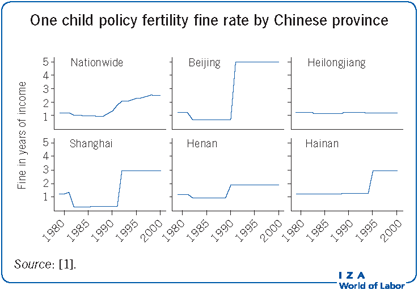Elevator pitch
The 20th century witnessed the birth of modern family planning and its effects on the fertility of hundreds of millions of couples around the world. In 1979, China formally initiated one of the world’s strictest family planning programs—the “one child policy.” Despite its obvious significance, the policy has been significantly understudied. Data limitations and a lack of detailed documentation have hindered researchers. However, it appears clear that the policy has affected China’s economy and society in ways that extend well beyond its fertility rate.
Key findings
Pros
Due to large variation in how the one child policy was implemented across regions and ethnicities, researchers are able to exploit natural variation in their analyses, which makes empirical results reliable.
Strictness of policy implementation is associated with promotion incentives for local leaders.
The one child policy significantly curbed population growth, though there is no consensus on the magnitude.
Under the policy, households tried to have additional children without breaking the law; some unintended consequences include higher reported rates of twin births and more Han-minority marriages.
Cons
There is no solid evidence that the one child policy contributed to human capital accumulation through the traditional “quantity–quality” trade-off channel.
Current economic studies mainly focus on short-term effects, while the long-term or lagged effects are substantially understudied; thus, statements about consequences and suggestions for policy designs are still missing.
The one child policy is associated with significant problems, such as an unbalanced sex ratio, increased crime, and individual dissatisfaction toward the government.
